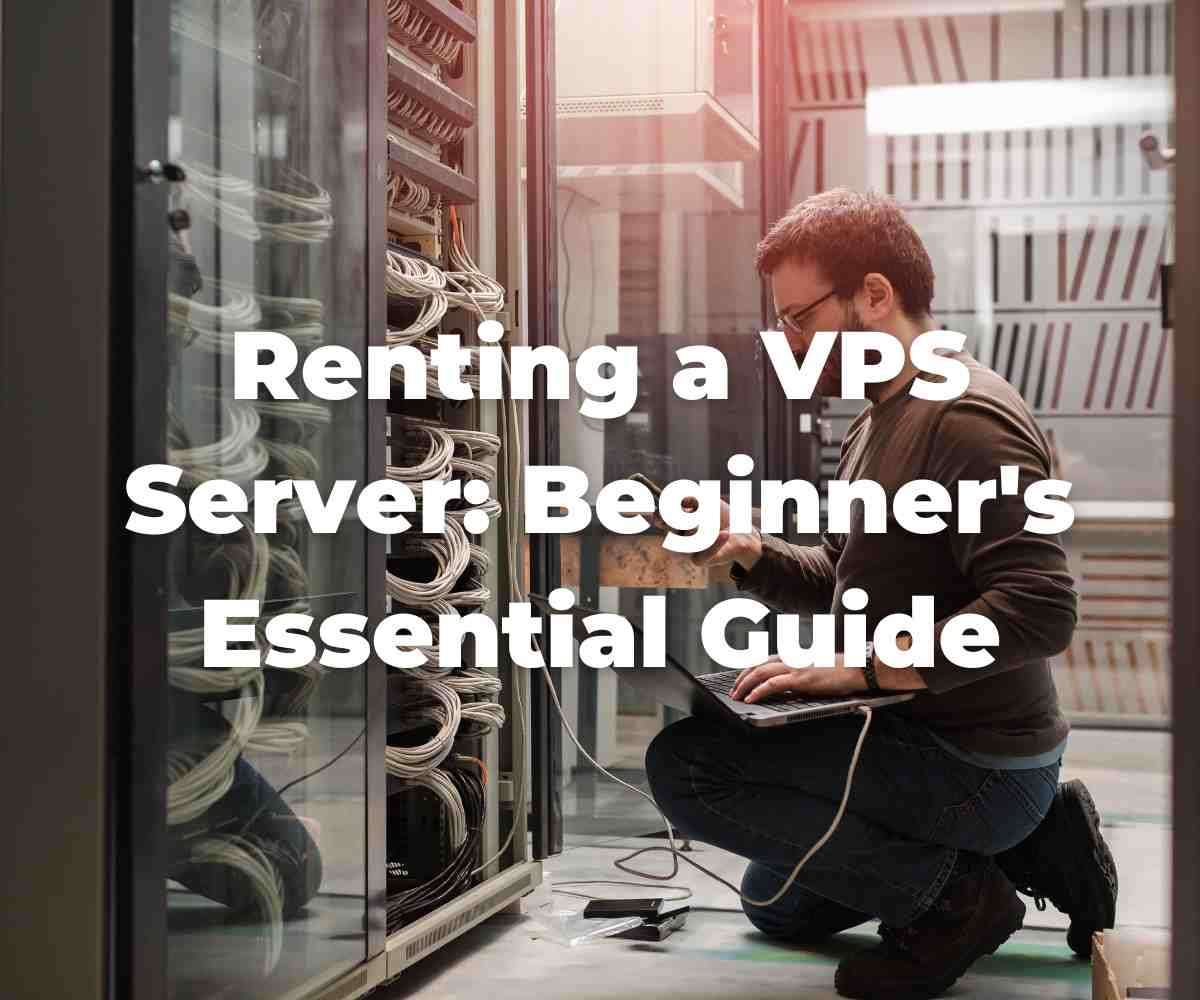
A Beginner's Guide to Renting a VPS Server: Everything You Need to Know
In today's fast-paced digital landscape, a reliable and robust web hosting solution is crucial for businesses and individuals. One popular option that offers greater control, flexibility, and performance is renting a Virtual Private Server (VPS).
The comprehensive guide will walk you through everything you need to know about renting a VPS server, including what it is when it is required, its advantages and disadvantages, and how to get started.
Renting a VPS: A Cost-Effective Solution for Your Hosting Needs
When it comes to hosting your website or applications, renting a VPS is a cost-effective solution that provides dedicated resources and greater control. You can easily rent a NVMe vps.
Unlike shared hosting where multiple users share the same resources, a VPS offers isolation and guarantees that other users' activities won't affect your website's performance.
This cost-effectiveness makes VPS rental a popular choice for businesses & individuals looking for a reliable hosting solution without the hefty price tag of a dedicated server.
What is a VPS Server, and When is it Needed?
A VPS server or Virtual Private Server is a virtualized hosting environment that provides dedicated resources within a shared physical server. It operates as an independent server with its own operating system, bandwidth, storage, and memory. A VPS is needed in various scenarios.
Hosting Multiple Websites or Applications
If you have multiple websites or applications to host, a VPS allows you to keep them isolated within a single server, ensuring better performance and security. Each website or application can have its resources and configurations, providing a reliable environment for your online presence.
Need for Control and Customization
With a VPS, you have root access and complete control over the server. This enables you to install custom software, configure server settings, and optimize performance based on your needs.
You can choose operating system, control panel, & other software components best suit your requirements. This level of control is precious for developers and businesses seeking a tailored hosting environment.
Handling Higher Levels of Traffic and Resource Requirements
When your website or application experiences a significant increase in traffic or requires more resources, a VPS can handle the higher demands more effectively than shared hosting.
With dedicated resources, you have the necessary power and scalability to accommodate growing traffic and ensure a seamless user experience. This scalability is vital for businesses anticipating growth or seasonal spikes in website traffic.
Developing and Testing in an Isolated Environment
Developers often need a separate environment for development and testing purposes. A VPS provides an isolated space to experiment without affecting the production environment.
It allows developers to work with different software configurations, test new features, and debug issues without impacting live websites or applications. This isolation is crucial for ensuring stable and secure software development processes.
Advantages of Renting a VPS Server
Renting a VPS server offers numerous advantages, making it an attractive hosting solution for businesses and individuals.
1. Enhanced Performance
With dedicated resources, a VPS server offers better performance than shared hosting. Your website or application will experience faster load times and improved responsiveness.
Since you are not sharing resources with other users, their activities do not affect your server's performance. This is particularly important for websites that have high-traffic or resource-intensive applications.
2. Scalability
VPS servers offer the flexibility to scale resources as your needs increase. Unlike shared hosting, where resources are limited, a VPS allows you to allocate additional CPU, RAM, and storage based on your requirements.
This scalability ensures that your website or application can handle increasing traffic and resource demands without compromising performance. As your business expands, you can seamlessly upgrade your VPS plan to accommodate the growth.
3. Customization and Control
A VPS gives you complete control over the server environment. You can install custom software, choose your preferred operating system, and configure server settings to match your requirements.
This level of customization allows you to optimize the server for your website or application's needs, enhancing performance and security.
Furthermore, you can implement specific security measures and software configurations tailored to your application's vulnerabilities and requirements.
4. Isolation and Security
One of the key advantages of a VPS is the isolation it provides. Since your resources are not shared with other users, you are not affected by their activities.
This isolation enhances security by reducing the risk of cross-contamination from other websites or applications. You can implement advanced security measures such as firewalls & intrusion detection systems, to protect your data and applications.
Additionally, many VPS providers offer regular backups and monitoring services to ensure the security and integrity of your server.
5. Root Access
With root access, you have administrative privileges to the server. This allows you to make system-level changes and install software or applications without restrictions.
Root access will enable you to customize your server environment and perform advanced configurations. It is precious for advanced users and developers who require complete control and the ability to install and configure specific software packages.
Disadvantages of Renting a VPS Server
While renting a VPS server offers numerous advantages, there are also disadvantages.
1. Technical Expertise Required
Managing a VPS server requires technical knowledge, including server administration, security configurations, and troubleshooting. If you are still getting familiar with these tasks, you may need to invest time in learning or consider managed VPS services.
Understanding server management concepts well and being comfortable with tasks like software installations, updates, and server monitoring is essential.
Alternatively, you can opt for managed VPS services, where the provider handles the technical aspects, allowing you to focus on your core business or website development.
2. Cost
VPS hosting is generally more expensive than shared hosting due to the dedicated resources and added features. However, the cost is justified by a VPS's improved performance and control.
The price of a VPS can vary depending on factors such as the allocated resources, provider reputation, support level, and additional services or features included in the package.
It's essential to consider your budget and the value that a VPS brings to your specific requirements. Remember that the potential benefits of enhanced performance, scalability, and customization can offset the cost of a VPS.
3. Server Management Responsibility
With a VPS, you are responsible for server management tasks such as server setup, software updates, security configurations, and regular maintenance.
This requires time and effort on your part. If you do not have the expertise or resources to handle server management, you may opt for managed VPS services. Managed VPS providers care for the technical aspects, allowing you to focus on your core business or website development.
Managed services come at an additional cost, but they provide peace of mind by offloading server management responsibilities to experts.
4. Server Monitoring
Monitoring your VPS server regularly is essential to identify performance issues or security threats. This can involve monitoring tools to track resource usage, network traffic, and server health.
Regular monitoring lets you detect and address bottlenecks, ensure optimal performance, and proactively handle potential security risks.
Monitoring services can be set up through the VPS provider or third-party tools. If you need more time or expertise to perform thorough monitoring, managed VPS services often include monitoring as part of their package.
Renting a VPS Server vs. Buying: Weighing the Options
When considering a VPS server, you can choose between renting or buying the server. Renting a VPS server offers greater flexibility, scalability, and cost-effectiveness than purchasing and maintaining a physical server.
Renting allows you to pay for the resources you need monthly or yearly without the upfront costs and long-term commitment of buying a server.
Additionally, renting a VPS server allows you to access the latest hardware and technology without worrying about hardware maintenance and upgrades.
Renting a Windows VPS Server: Meeting Your Specific Requirements
You can buy Windows VPS server if you require a Windows-based environment for your applications or specific software compatibility. Windows VPS servers provide all the advantages of a VPS while running the Windows operating system, offering seamless integration and familiarity for Windows users.
Windows VPS servers are ideal for businesses and individuals who rely on Microsoft technologies or require specific Windows-based software for their operations.
Getting Started with VPS Rental: A Step-by-Step Guide
- Assess Your Hosting Needs: Determine the resources and specifications your website or application requires, including CPU, RAM, storage, and bandwidth. Consider factors such as anticipated traffic, growth potential, and software requirements.
- Research VPS Providers: Look for reputable VPS providers that offer reliable services, good customer support, and flexible plans that align with your needs and budget. Read reviews & compare the features and pricing of different providers to make an informed decision.
- Choose an Operating System: Decide whether you need a Linux-based or Windows-based VPS based on your software requirements and familiarity. Consider factors such as compatibility, available software packages, and support.
- Select a VPS Plan: Consider the allocated resources, scalability options, support level, and pricing of different VPS plans. Choose a plan that meets your current needs and allows for future growth. Consider factors like CPU cores, RAM, storage capacity, and bandwidth allocation.
- Set Up and Configure Your VPS: Once you have chosen a provider and a plan, follow their instructions to set up your VPS server. This may involve selecting server locations, configuring security settings, and installing necessary software. Most VPS providers offer user-friendly control panels to streamline the setup process.
- Optimize and Secure Your VPS: Optimize your VPS server for performance and security after the initial setup. Implement best practices such as regular backups, software updates, firewall configurations, and strong passwords. Ensure that your server is properly hardened and protected against potential security threats.
- Monitor and Maintain Your VPS: Regularly monitor your VPS server to ensure optimal performance, address any issues promptly, and take necessary actions to protect your server and data. Set up tracking tools or utilize the monitoring services provided by your VPS provider. Stay proactive in maintaining your server and promptly address performance or security concerns.
Conclusion
Renting a VPS server offers numerous advantages, including enhanced performance, control, scalability, customization, and security. However, it does come with some challenges, such as the need for technical expertise and server management responsibilities.
By understanding the fundamentals of VPS servers, including what they are, when they are needed, and their advantages and disadvantages, you can decide whether renting a VPS server is the right choice for your hosting needs.
When considering a VPS provider, evaluating factors such as your technical abilities, budget, resource requirements, growth potential, and the level of support the provider offers is essential.
Look for reputable VPS providers with a track record of reliability, good customer support, and flexible plans that match your specific needs.
With the right provider and proper server management practices, you can leverage the benefits of a VPS server and create a reliable and high-performing online presence.

Local Business Listing
Get a PagePromote your business to local customers.
software In Software
what makes firefox a better choice than google chrome for users
Added On (2023-12-25 13:14)
why crm is important
Added On (2023-11-07 22:51)
how to choose right billing software for healthcare
Added On (2023-08-05 00:37)
best digital wealth management platforms
Added On (2023-08-01 21:51)




